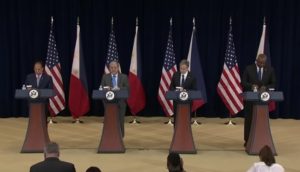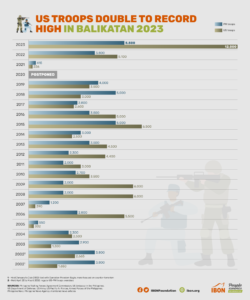US tightens grip on PH as launchpad for aggression
12,000 US occupation troops on PH soil for biggest, longest ‘Balikatan’
THE United States has tightened its stranglehold of the Philippines as a launchpad for its military aggression against the countries and peoples of Asia, China in particular, with some 12,000 US occupation troops now on Philippine soil for the start of this year’s ‘Balikatan’ military exercise—the largest and longest in years– along with some 5,000 Filipino soldiers participating and 111 soldiers from Australia.
The “containment” of China and the US’ ongoing effort to surround its borders with military bases on the soils of its puppet regimes in Asia and the Pacific—Japan, South Korea, Taiwan, Australia and the Philippines– is the strategic thrust of American Imperialism under the ‘Pivot to Asia’ doctrine enunciated by Pres. Barack Obama in 2012.

With 4 new US bases in the Philippines, the country would very soon again play a major role in American aggression in Asia, a role it has been playing since the end of World War 2 when US bases in the country are the most numerous and biggest outside of the US mainland.
Filipino troops have been commandeered by the US to die in its intervention in the Korean Civil War in 1950 and in its aggression in Vietnam the following decade, among other conflicts instigated by the US Imperialism.
The number of American occupation troops trampling on Philippine territory this year is the biggest to date, nearly double since 2015 when 6,500 US troops participated.
The military drill with China as the ‘theoretical enemy’ would last from April 10 to April 28, 2023 and involves ‘live-fire’ exercise that include allowing Filipino troops to familiarize with American military hardware such as the ‘Javelin’ anti-tank missile– that have just been discredited in performance in the ongoing US-proxy war in Ukraine.
Balikatan shows ‘auxiliary’ nature of PH soldiers
A table prepared by the think tank, ‘Ibon Foundation’ showed that in many of the annual Balikatan exercises since 2002, there are more US troops participating than Filipino soldiers, emphasizing the Philippine Armed Forces’ auxiliary role in American war plannings.

The table showed that from 2002 to 2023 where 23 military exercises were held, there were only 8 instances when the number of Filipino troops far exceeded those of the United States: 2002, 2003, 2005, 2007, 2014 and from 2017 thru 2021. The COVID-19 pandemic forced the cancellation of the Balikatan in 2020 while two exercises were held in 2002.
The following day the war drill opened, two American lackeys in the Philippine government, Department of National Defense (DND) Senior Undersecretary and Officer-in-Charge Carlito Galvez and Department of Foreign Affairs (DFA) Secretary Enrique Manalo were in Washington, April 11, 2023, for the ‘2+2 Dialogue’ with their American superiors, US defense secretary Lloyd Austin and State Secretary Anthony Blinken, respectively.
Purportedly, the “dialogue” is to finalize both countries’ commitment to “regional security” and “reaffirm” their “common priorities as treaty allies,” according to the press release Manalo issued a week before he and Galvez trooped to Washington.
Stripped of the references to purported American assistance on energy, global warming, business opportunities, “modernization” of the Philippines’ defense capabilities, among others, the joint statement issued that day exposed the Philippines’ utter servility to US wishes, mouthing the US condemnation of North Korea and support for Ukraine, one of the American vassal states in Europe, aside from the NATO countries.
On these two issues, the Philippines has no vested interest at stake but Galvez and Manalo had to demonstrate their fealty to the Americans on all issues that matter to the United States.
The joint statement also made clear that the Balikatan exercises and the PH-US alliance is targeted against China, referencing to the 2016 Hague arbitral award as “final and legally binding” between China and the Philippines, despite this not being the case as the texts of the award would show.
In response, China’s foreign ministry spokesman, Wang Wenbin, the next day, April 12, 2023, accused Washington and Manila of making “false accusation” against China in their joint statement during his regular press briefing in Beijing (see related article).



